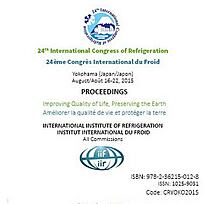
Document IIF
Analyse énergétique et approche du calcul des charges thermiques : application aux locaux industriels agroalimentaires.
Energy analysis and heat loads calculation approach: application to agrifood industrial premises.
Numéro : pap. n. 173
Auteurs : GONÇALVES J., NUNES J., SILVA P. D., et al.
Résumé
Nowadays, the agrifood industry is increasingly concerned about energy bills. Thus, there is an increasing trend on the implementation of measures and procedures that ensure and promote energy efficiency. Computational modelling is a powerful tool for project and design of engineering systems, allowing to anticipate and/or correct problems that may lead to inefficiencies. The purpose of this paper is to assess the energy performance of refrigerated premises of a real company modelled in EnergyPlus. The data that characterize the company and the production process were collected previously through an energy audit. Results of the comparison between real case and simulation show that the cooling system represents 56.4% and 47.8% of the total electrical energy consumption, respectively. Also, it is found that heat transmission loads trough cold rooms envelope and air infiltration are those that most affect the energy performance, accounting for almost 80% of the refrigeration needs of the company.
Documents disponibles
Format PDF
Pages : 7 p.
Disponible
Prix public
20 €
Prix membre*
Gratuit
* meilleur tarif applicable selon le type d'adhésion (voir le détail des avantages des adhésions individuelles et collectives)
Détails
- Titre original : Energy analysis and heat loads calculation approach: application to agrifood industrial premises.
- Identifiant de la fiche : 30015340
- Langues : Anglais
- Source : Proceedings of the 24th IIR International Congress of Refrigeration: Yokohama, Japan, August 16-22, 2015.
- Date d'édition : 16/08/2015
- DOI : http://dx.doi.org/10.18462/iir.icr.2015.0173
Liens
Voir d'autres communications du même compte rendu (657)
Voir le compte rendu de la conférence
-
3D and transient numerical modeling of door ope...
- Auteurs : CARNEIRO R., GASPAR P. D., SILVA P. D.
- Date : 16/08/2015
- Langues : Anglais
- Source : Proceedings of the 24th IIR International Congress of Refrigeration: Yokohama, Japan, August 16-22, 2015.
- Formats : PDF
Voir la fiche
-
Amélioration des parois des chambres froides lo...
- Auteurs : BABAKIN S. B.
- Date : 06/12/2004
- Langues : Russe
- Source : Refrigeration industry in the 21st century + CD-ROM.
Voir la fiche
-
A modified model to predict air infiltration in...
- Auteurs : CLELAND D. J.
- Date : 2004
- Langues : Anglais
- Source : ASHRAE Transactions. 2004 Winter Meeting. Volume 110, part 1 + CD-ROM.
Voir la fiche
-
COLD STORAGE DOORS: LIFE CYCLE COSTING REPAIR O...
- Auteurs : MINER S. M., BALBACH G. C.
- Date : 24/08/1987
- Langues : Anglais
- Source : Development in refrigeration, refrigeration for development. Proceedings of the XVIIth international Congress of Refrigeration.
- Formats : PDF
Voir la fiche
-
The mathematical model and computer program for...
- Auteurs : CICONKOV R., CICONKOV S.
- Date : 02/12/2009
- Langues : Anglais
- Source : Zbornik radova. 40. Medunarodni kongres o grejanju, hladenju i klimatizaciji./ Proceedings. 40th International congress on HVAC&R.
- Formats : PDF
Voir la fiche
